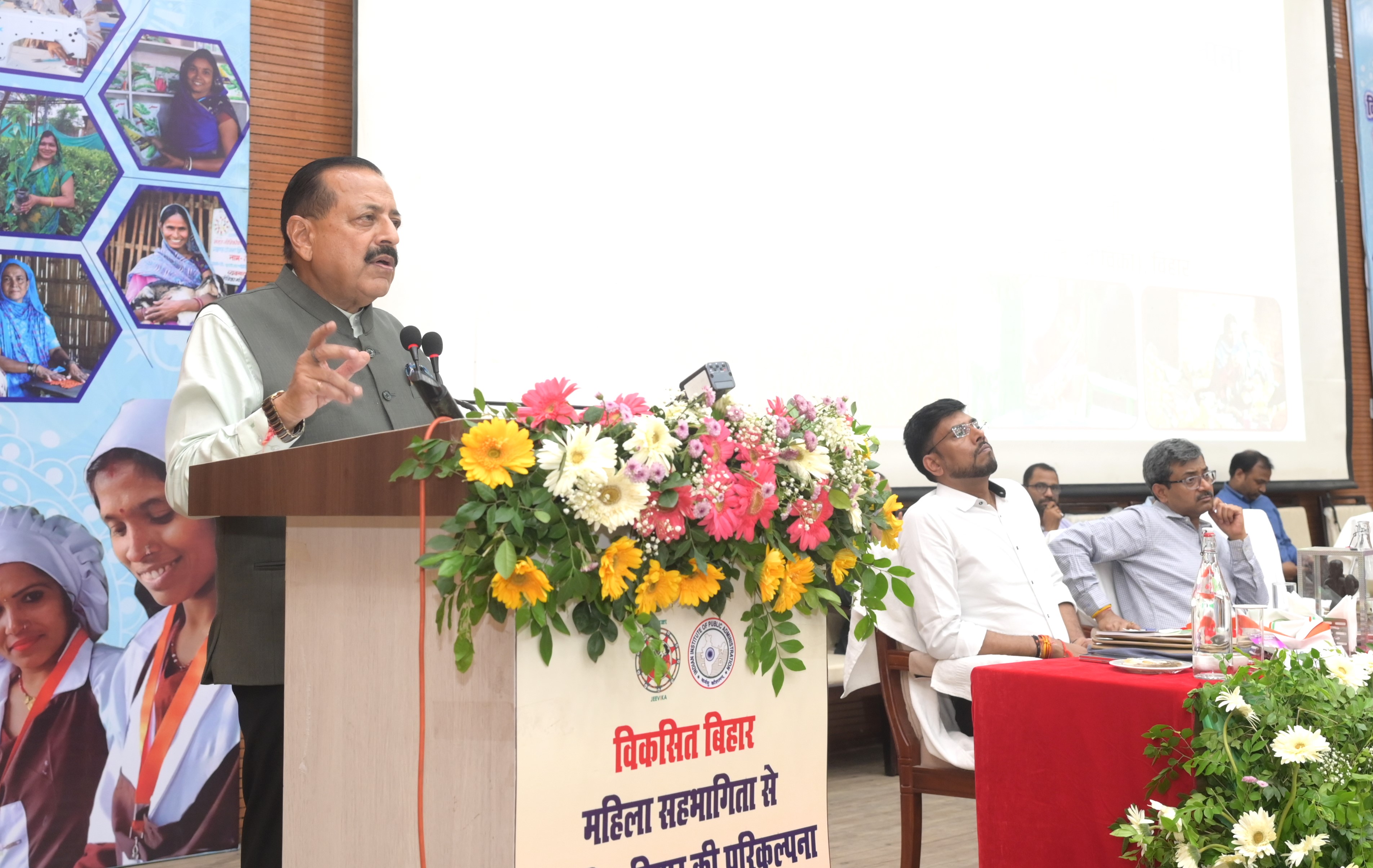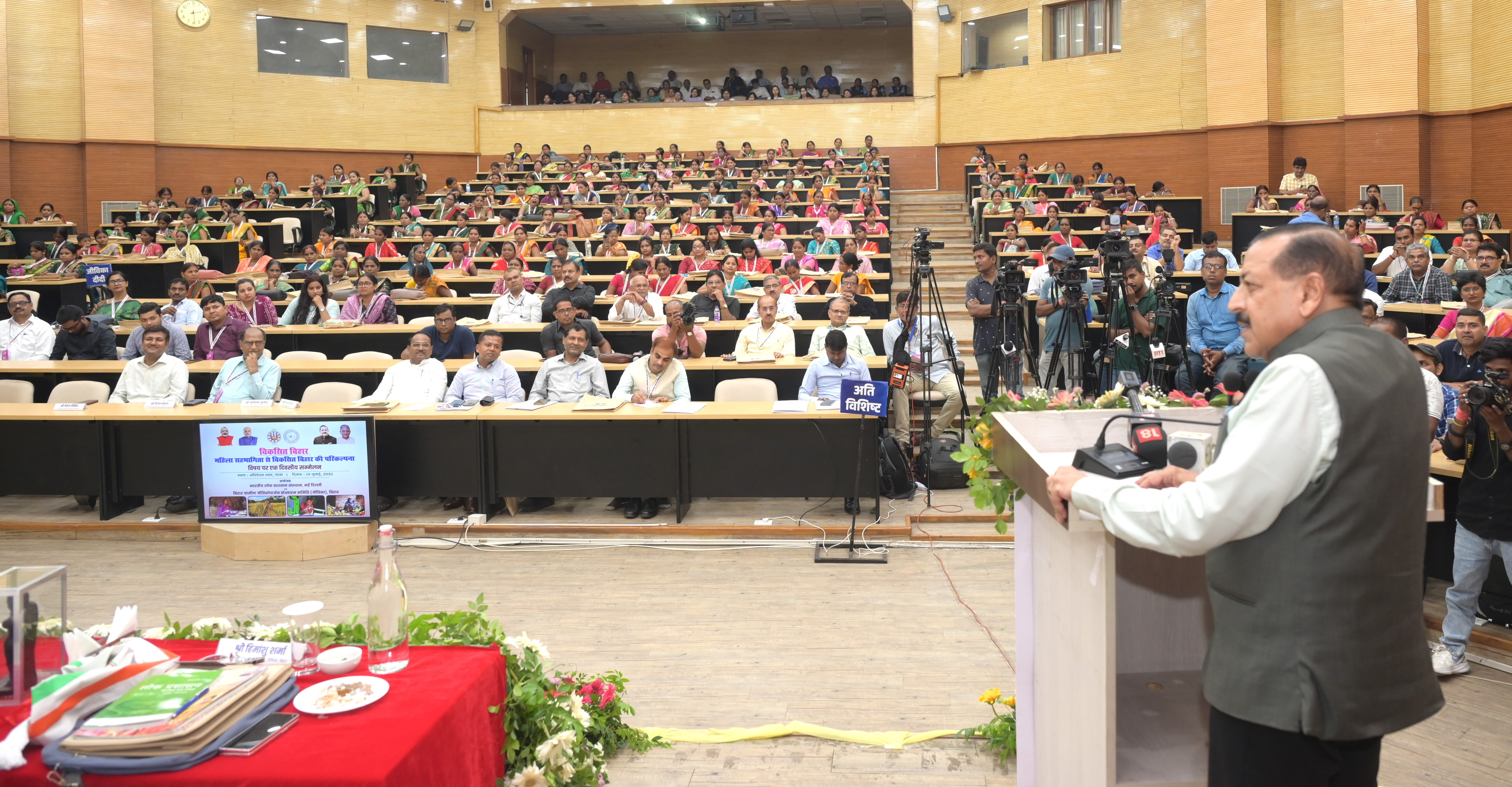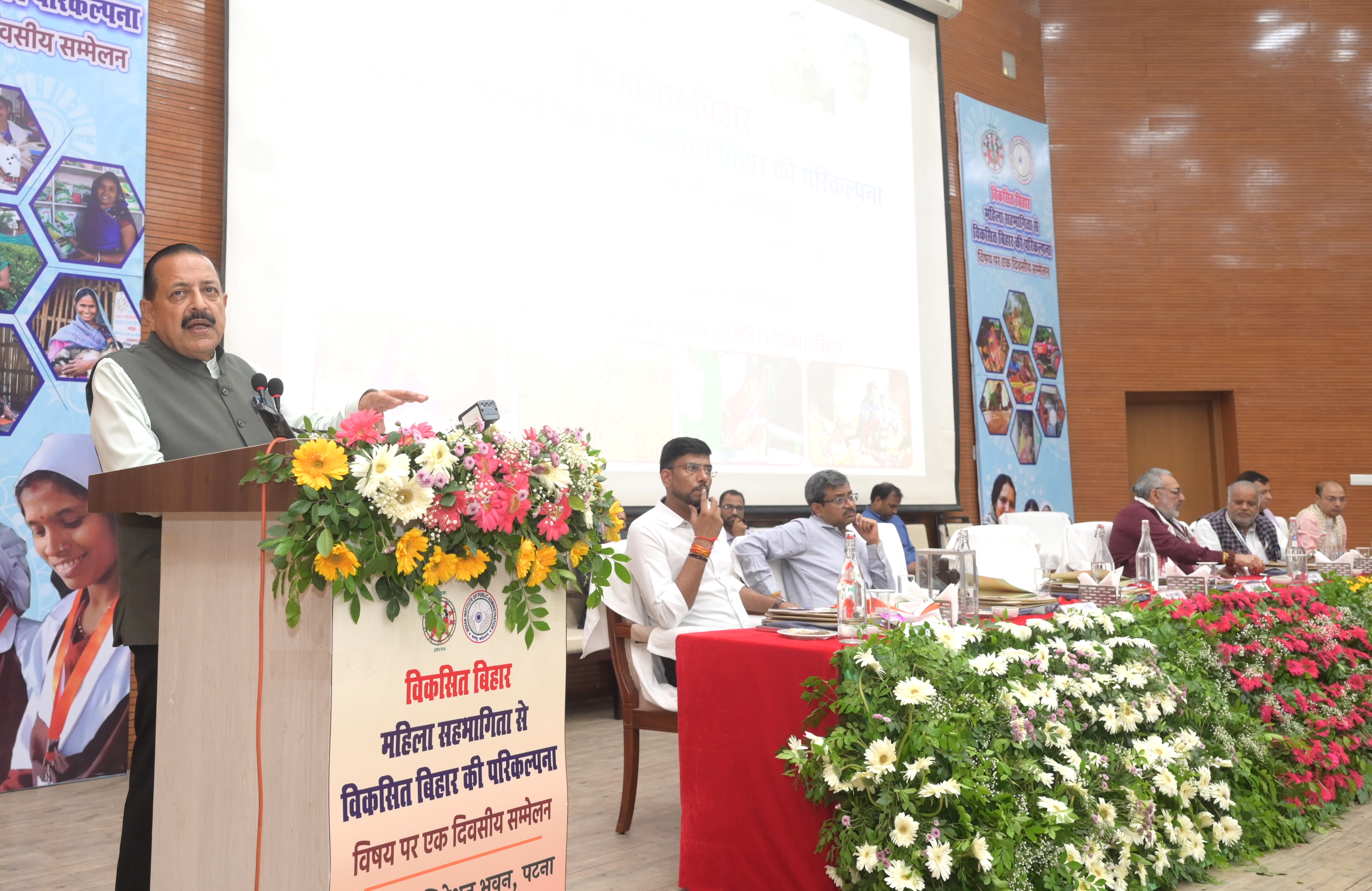Union Minister Dr. Jitendra Singh says, “Around 76,000 StartUps in India today are women-led and a large number of them from Tier 2 and Tier 3 towns”
Union Minister Dr. Jitendra Singh says, “Around 76,000 StartUps in India today are women-led and a large number of them from Tier 2 and Tier 3 towns”
Union Minister of State (Independent Charge) for Science & Technology, Earth Sciences, and Minister of State in the Prime Minister’s Office, Personnel, Public Grievances and Pensions, Department of Atomic Energy and Department of Space, Dr. Jitendra Singh, said that around 76,000 StartUps in India today are women-led and a large number of them from Tier 2 and Tier 3 towns.
The Minister said that India’s path to becoming a developed nation by 2047 will be led by empowered women and youth, as envisioned by Prime Minister Narendra Modi under the paradigm of Women-Led Development. Dr. Jitendra Singh was addressing the one-day conference titled “Viksit Bihar: Envisioning a Developed Bihar through Women’s Participation”, jointly organized by the Department of Rural Development, Government of Bihar, in collaboration with the Indian Institute of Public Administration (IIPA), New Delhi, of which Dr. Singh is the Co-Chairperson.
In his address, Dr. Jitendra Singh stated that over the last 11 years, the Modi Government has focused its governance architecture around four pillars—the Poor, Farmers, Youth, and Women—with women consistently placed at the top. He said, “Women-centric governance has not only empowered individuals, but reshaped society. What began as targeted welfare has now evolved into institutional leadership.”
The Minister launched the Jeevika E-Learning Management System App, aimed at providing accessible learning for women, and unveiled the publication titled “Shashakt Mahila, Samriddh Bihar”, which celebrates women’s contributions to Bihar’s progress.
Dr. Jitendra Singh elaborated on the Modi Government’s structured and comprehensive approach to women empowerment, built across four key pillars.
The first phase, Access and Inclusion in Institutions, marked a historic shift in India’s educational and military landscape. Girls were admitted for the first time into Sainik Schools and the prestigious National Defence Academy (NDA), breaking age-old barriers. Combat roles in the armed forces were opened to women, with the country now anticipating its first woman Army Chief—an unprecedented milestone in gender-inclusive leadership.
The second phase, Scientific and Technological Empowerment, has empowered women through targeted schemes such as WISE (Women in Science and Engineering), GATI (Gender Advancement for Transforming Institutions), CURIE, and the Women Scientist Programme. These initiatives are designed to help women re-enter STEM careers, especially after career breaks. In a focused effort, Patna Women’s College in Bihar is set to be adopted under the CURIE scheme for financial and technological support, further advancing the state’s leadership in women’s empowerment.
The third phase, Economic and Social Empowerment, has witnessed a massive scale-up of women’s access to financial resources. Over 48 crore Jan Dhan accounts have been opened for women, while more than 60% of Mudra Yojana beneficiaries are women entrepreneurs. The creation of over 3 crore ‘Lakhpati Didis’ through Self-Help Groups (SHGs) is transforming rural economies. Under the Pradhan Mantri Awas Yojana, homes registered in women’s names are providing not just shelter but also financial and social dignity.
The fourth phase, Workplace Reforms and Legal Sensitivity, has introduced compassionate and inclusive governance measures. These include six-month paid childcare leave for women in government service, pension rights extended to unmarried or divorced dependent daughters, and maternity leave provisions even after stillbirths—demonstrating a humane and progressive legal framework that places women’s needs at the center of policymaking.
Dr. Jitendra Singh reiterated that these four pillars collectively represent the Modi Government’s unwavering commitment to making women not just beneficiaries, but leaders of India’s growth story.
Dr. Jitendra Singh emphasized that Indian women are no longer passive participants, but strategic leaders across fields like space, civil services, and innovation.“From Chandrayaan-3’s Kalpana to Aditya-L1’s Nigar Shaji, women have led India’s space glory,” he noted.
The Minister also highlighted that the first-ever woman Director General now heads CSIR, with over one-third of CSIR laboratories across India led by women scientists—marking a significant shift in the scientific leadership landscape.
India now hosts 1.7 lakh startups, with around 76,000 led by women, generating over 17 lakh jobs, Dr. Singh revealed. These are not just urban phenomena—Tier 2 and Tier 3 cities, including smaller towns in Bihar, are emerging as hotbeds of women-led innovation.
“This silent revolution is rewriting India’s future, led by first-generation women entrepreneurs, researchers, and policy-makers,” he said.
Dr. Jitendra Singh commended Bihar for its pioneering reforms in advancing women’s empowerment, highlighting initiatives such as 50% reservation for women in Panchayats and urban local bodies, and 35% reservation in the state police and civil services. He noted that over 30 lakh women in Bihar have been financially empowered through targeted schemes, with cumulative support exceeding ₹5,000 crore. Dr. Singh urged the Indian Institute of Public Administration (IIPA) to document Bihar’s successful women-centric governance model into a replicable manual, so that other states across the country can draw inspiration and implement similar transformative reforms.
Concluding his remarks, Dr. Jitendra Singh called for a fundamental shift in the national mindset, emphasizing that “it is no longer about women’s participation—it is about women-led development. The future belongs to women who lead, not just follow.” He reaffirmed that the vision of Viksit Bharat@2047 will be realized with women at the forefront—in laboratories, legislation, leadership, and everyday life—paving the way for a truly inclusive and aspirational India.
The event was also attended by Giriraj Singh, Union Minister for Textiles; Rajiv Ranjan Singh, Union Minister for Fisheries, Animal Husbandry and Dairying; and Shravan Kumar, Bihar’s Minister for Rural Development, S.N.Tripathi DG IIPA, Himanshu Sharma, CEO Jeevika Mission, Pratyay Amrit, Development Commissioner, Bihar and other senior officials.


